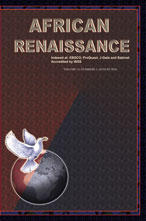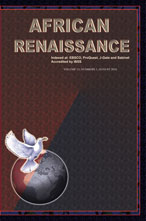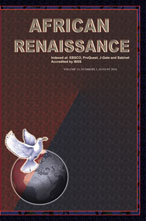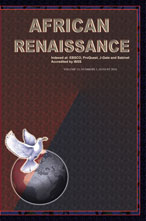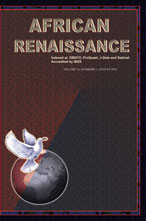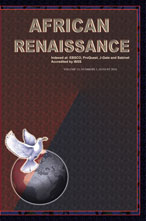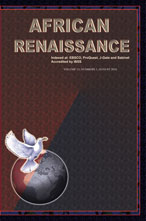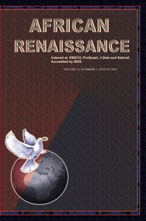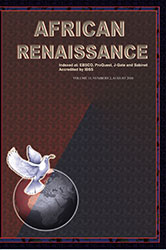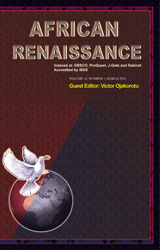
 editor@adonis-abbey.com
editor@adonis-abbey.com ![]() UK: 0207 795 8187 / Nigeria:+234 705 807 8841
UK: 0207 795 8187 / Nigeria:+234 705 807 8841

Publication Frequency: Quarterly (Four times a year) (ISSN 1744-2532 E- ISSN 2516-5305). SCImago Journal Ranking for 2024: Quartile: Q3; SJR: 0.165
View Table of Content
African Renaissance Vol. 16, (No. 4), December 2019.
This edition focuses on contemporary issues of Africa’s development. In line with the tradition of African Renaissance of sustaining intellectual discourse, African scholars thought aloud on advancing and consolidating Africa’s development process. In this edition, the first set of papers interrogate the implications of United Nations’ peace keeping missions in Africa, drawing from the experiences of Congo, South Sudan and the Central African Republic; mitigating malfeasance politics in the ivory towers, as well as South African’s perspective on the nexus between migration and xenophobic attacks, especially, in post-1994 South Africa respectively. The second set of papers revisited the trajectories of land ownership in South Africa, the strategy of justice dispensation and reconciliation in Zimbabwe and improving service delivery in South Africa. The last set of papers explores combating the socio-cultural drivers of HIV/AIDS scourge in South Africa throug...
View Table of Content
African Renaissance Vol. 16, (No. 3), September 2019. Editor: Prof. Victor Ojakorotu
As usual, it is my delight that another intellectually stimulating, as well as gratifying scholarships - through the medium of the African Renaissance- focused on contradicting the immanent variables, forces and factors that condition Africa to be under-developed hits the public space again. Truly, the immanent contradictions of development that besieges Africa are both numerous and of nuance character, hence the multi-dimensional versatility of the diagnosed topics in this Edition. The Edition begins with further interrogating the federal paradigm’s functionality on the throes of efficient local administrations in place from the Nigerian experience as the prism for other African federal systems. Following the first topic of currency are discourses attentive to the advancement of e-education, the question of nationalism and ethnicity and an insightful interrogation of good governance and service delivery during the Jacob Zuma administration. Ghana’s youths, migratio...
View Table of Content
African Renaissance Vol.16, No.2 June 2019 Editor: Prof. Victor Ojakorotu
Just like the previous editions of the African Renaissance, this Edition continues in our tradition of sustaining intellectual discussions by African scholars for Africa’s overall advancement. The task of developing Africa affords no time for relaxation. And, in fact, this is exactly what this Edition underscores going by the topicality of developmental issues addressed in all the papers. This Edition begins by diagnosing causative factors associated with the problem of youth restiveness. It then engages topics like America’s hegemonic preponderance, democratic consoled-ation in the continent, the implication of child marriage on gender empowerment and on strides necessary to decolonise education in Africa. It takes up with keen interest the question of multilateral social dialogue Africa needs for her transformation and the vulnerability that young Zimbabwean female immigrants are exposed to, as well as the contribution of African immigrants to global knowledge repository. The par...
View Table of Content
African Renaissance Special Issue March 2019 Editor: Prof. Victor Ojakorotu
African Renaissance has as a mandate to provide intellectual insights into the dynamics of the crisis of development that bedevils the African continent. Over the course of the several volumes of the journal, efforts have been made to contribute to the ongoing debates on the continent. This Special Issue of the African Renaissance keeps the tradition going with robust and well-researched contributions from scholars in the continent. The issue presents a veritable platform for the discourse of some of today’s most important issues such as food security, electoral justice, sustainable development, national integration, peace-building, decolonization, conflict and conflict resolution, xenophobia, land expropriation, diaspora, refugees, leadership among others. It of note that contributors to this Special Issue have taken the pain to look critically into these issues with a view to providing workable African solutions to Africa problems. One other tradition of the African Re...
View Table of Content
African Renaissance Vol.16, No.1 March 2019 Editor: Prof. Victor Ojakorotu
African Renaissance continues to pursue its ideals of contributing to drive towards the development of the African continent through the publishing of high quality intellectual and academic research. In line with its vision and mission, the Issue of the journal deals with a broad range of issues such as trade war, human security, language development, elections, academic performance, entrepreneurship, health advocacy, migration, human rights, tourism among others. These issues were extensively dealt with by individual authors, some with far-reaching and practicable policy recommendations. The multidisciplinary nature of the contributions are also worthy of note as issues were considered from diverse perspectives and intellectual traditions. In line with the tradition of excellence and academic integrity established by African Renaissance, each article underwent rigorous process of review. This is to ensure that necessary gaps were closed in selected articles. We are sure tha...
View Table of Content
African Renaissance Vol. 15, No. 4, December 2018 Editor Prof. Victor Ojakorotu
African Renaissance has a mandate to proffer practical solutions to Africa’sdeep and multi-faceted social, economic and political crises. Successive issues of the journal have striven to keep this tradition of excellence.Therefore, this present issue comes with refreshingly new perspectives and potentials for moderating African crises. Important issues such as Africanization, globalization, development, media, peace, migration,economy, politics, foreign policy, security and other ones that are at the heart of African realities. Issues covered in this are wide-ranging and ofcourse from contributors from diverse backgrounds, thereby giving a multi-disciplinary breath to it. Each article has been treated professionally and in line with academic sound academic traditions. Accepted papers have been thoroughly reviewed and suggestions for improvement dutifully carried out. I therefore wish to extend appreciation to reviewers and contributors who worked hard to ensure that each pape...
View Table of Content
African Renaissance Special Issue December 2018
African Renaissance has through its previous editions shown unwavering commitment to providing intellectual interventions by Africans in a bid to provide African solutions to African problems. This tradition of academic and intellectual excellence continues in this Edition of the journal. In terms of coverage, articles in this Edition cover some of the most important issues on Africa’s socio-economic dynamics and travails. Issues such as African indigenous knowledge, resource conflict, African cooperation, national security, communication, food security in Africa, globalisation, climate change, political crisis, violence, nation building, gender, social media, culture and development among others. This goes to show how well-spread the range of issues covered in the Edition and it is a testament to the continued provision of outstanding African scholars to contribute intellectually to the African situation. Articles in the Edition have been professionally reviewed, with correctio...
View Table of Content
African Renaissance Vol. 15, No. 3, August 2018
African Renaissance has been at the forefront of providing logical and evidence-based intellectual intervention to African problems. The Journal endeavours to be a foremost collection of peer-reviewed articles in the best of academic traditions in the African continent. This present Edition therefore is a continuation of academic excellence built since the inception of the Journal. It covers issues such as governance, media, resource politics, trade, development and underdevelopment, HIV/AIDS, gender, migration and African security. This collection of important and contemporary issues and challenges in the African continent is an apt demonstration of the focus of the African Renaissance. I believe that the issues raised in these articles and recommendations offered by scholars from diverse academic backgrounds in different universities have the capability of proffering solutions to some of Africa’s age-long and festering problems. All the articles published in ...
View Table of Content
African Renaissance Vol. 15, No. 2, June 2018
This is yet another set of highly intellectual and thought provoking contributions to knowledge from African Renaissance, and for the month of June, 2018. It is a continuous attempt towards exploring and interrogating social issues that confront Africa and the entire world. Articles in this edition have made frantic intellectual efforts towards exploring many social issues in Africa from theoretical as well as empirical points of view. They have been peer reviewed before being carefully and meticulously selected by the editor. I sincerely appreciate all who have made this special edition another huge success. Thank you all. Professor Victor Ojakorotu Acting Deputy Director School of Government Studies Faculty of Humanities North West University Mafikeng, South Africa...
View Table of Content
African Renaissance Vol. 15, (No 1), March 2018 Guest Editor: Victor Ojakorotu
I hereby present with great pleasure, another Issue of the Journal, African Renaissance for the month of April 2018. This is a continuous attempt towards exploring and interrogating social issues that confront Africa and the entire world, in order to work around fashioning pragmatic solutions to them. I strongly believe that the task of African Renaissance can come in many forms, some of which can be examining, exploring, explaining, inquiring , modeling, inventing, re- inventing, criticizing and so on. Our research endeavors in the humanities are often tailored towards the foregoing, and we must just continue with the tradition if we wish to solve African problems. It is from the foregoing approaches that all the articles included in the edition have attempted to explore issues around the renaissance of Africa, especially from the point of view of re-interrogation. All the articles have been peer reviewed; carefully and meticulously proces...
To subscribe to any of the journals, Please Email Us.




